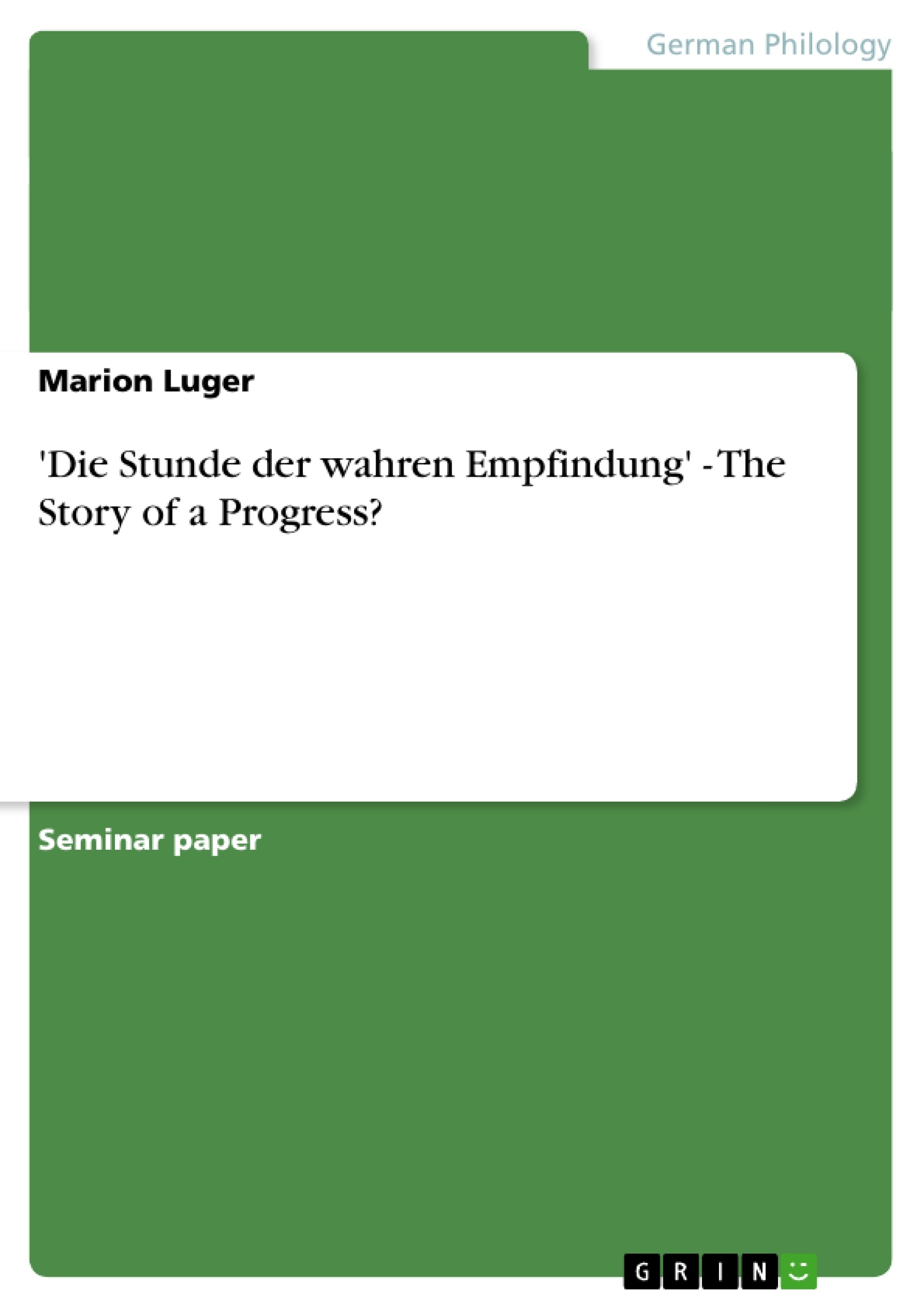As far as the moral of the novella “Die Stunde der wahren Empfindung” is concerned, David Roberts recognizes Peter Handke’s inability to decide “zwischen der existentiellen Symbolik von Tod und Wiedergeburt und der richtungslosen Unbestimmtheit einer Fortsetzungsgeschichte” and states that “[d]ie Inkonsequenz der Erzählung [...] buchstäblich ohne Konsequenz [ist]“. Similarly, Gunther Pakendorf regards the story „als Verlegenheitslösung, als Zeichen der Auswegslosigkeit und Ohnmacht der Wirklichkeit gegenüber“.
In opposite to these negative interpretations, I will attempt to prove that the protagonist does experience personal development which might lead him to enjoy a positive future. Firstly, the essay will indicate the manner in which Gregor Keuschnig copes with the challenge of discovering hitherto unknown emotional facets of his personality (section II). Thereafter, section III illustrates the alteration in Keuschnig’s thinking towards the conventional order of things; then section IV investigates Keuschnig’s change of attitude regarding those things he feels are significant. Finally, section V deals with an alternative relationship between the individual and society.
[...]
Inhaltsverzeichnis (Table of Contents)
- I. Introduction
- II. From suppression to confession
- III. From a secure system to a vivid individuality
- IV. From meaning to ideas
- V. From an isolated to a self-confident individual
- VI. Conclusion
Zielsetzung und Themenschwerpunkte (Objectives and Key Themes)
This essay aims to challenge the negative interpretations of Peter Handke’s novella “Die Stunde der wahren Empfindung” and to demonstrate that the protagonist undergoes a positive personal development. It focuses on Gregor Keuschnig's journey of self-discovery and his transformation from a suppressed and alienated individual to a self-confident individual who embraces his true emotions.- Gregor Keuschnig's struggle to confront his suppressed emotions and embrace his true self
- The role of dreams and subconscious desires in shaping Keuschnig's identity
- The tension between societal expectations and individual authenticity
- Keuschnig's alienation from both himself and society
- The transformative power of self-acceptance and the release of suppressed emotions
Zusammenfassung der Kapitel (Chapter Summaries)
II. From suppression to confession
After a dream that reveals his true self, Gregor Keuschnig experiences a radical change in his life, leading to a feeling of estrangement and alienation from both himself and society. He is unable to live up to his new identity due to fear of societal judgment, resulting in the suppression of his true emotions and a constant need to pretend. Keuschnig's inner turmoil and fear of being exposed leads to a sense of hopelessness and despair.III. From a secure system to a vivid individuality
Keuschnig attempts to establish a new order in his life by seeking structure and predictability, which he finds in the seemingly unwavering regulations of police officers. He envies their adherence to pre-established procedures and seeks a sense of order that can counter the turmoil within him.IV. From meaning to ideas
This section explores Keuschnig's changing understanding of meaning and his evolving relationship with ideas.V. From an isolated to a self-confident individual
This section examines Keuschnig's shift from a state of isolation and self-doubt to a more confident and self-assured individual.Schlüsselwörter (Keywords)
This essay explores the themes of self-discovery, alienation, societal expectations, authenticity, suppression, and transformation within the context of Peter Handke's novella “Die Stunde der wahren Empfindung.” It examines the protagonist's journey of coming to terms with his true self and his struggle to reconcile his inner desires with the demands of society. Key terms include: "Die Stunde der wahren Empfindung," Peter Handke, Gregor Keuschnig, self-discovery, authenticity, alienation, suppressed emotions, societal expectations, transformation.- Quote paper
- Marion Luger (Author), 2001, 'Die Stunde der wahren Empfindung' - The Story of a Progress?, Munich, GRIN Verlag, https://www.grin.com/document/134833




